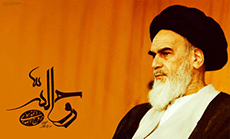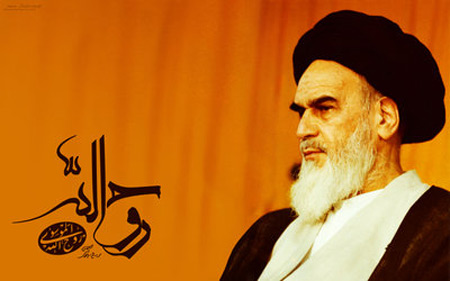
Ruhollah Al-Khomeini: The Imam Who Doesn’t Die

Linda Ajami

"Since the day we knew him, we have changed and so has the world around us changed," Hizbullah Secretary-General, His Eminence Sayyed Hassan Nasrallah has affirmed.
"Imam Khomeini is a bullet that has been fired since the seventh century to settle within the heart of the twentieth century," the famous Egyptian journalist, Mohammad Hasanen Haykal, has said.
"Imam Khomeini is a majestic leader unmatched by anyone in our east," Lebanese author, Suleiman Katany, described.
Imam Khomeini is "the man of the year," the American Times newspaper mentioned in 1979.
"The world lost the most honest person," former Prime Minister Margaret Thatcher said on the day he died.
He was an expert, an Islamic philosopher, an intellectual, a leader and a politician, who has set up an approach to life, a revolution and a nation. He is the Mohammedan, pure, honest and noble Islamic approach. He is Ruhollah Imam Khomeini (peace be upon him).
Imam Khomeini: An exceptional man
Imam Khomeini was not just any passerby in human history; he was an exceptional phenomenon within an exceptional time period throughout entire history. He left in people -lovers as well as others- admiration and thousands of questions about his personal secret about how compassion and strength, humility and greatness, firmness and leniency are mixed together in one man's heart!? How jurisprudence, gnosis, state administration and the nation's leadership are gathered together? How the wisdom of revolutionary leadership and the care for humanity in supporting the oppressed and powerless people can be gathered in one's personality?
Although he is a revolutionary religious scholar, who has written a chapter different than his predecessors, the Imam has stressed the need to hold on to religion of Islam. He once said: In Islam, there is one government- the government of God; and there is one law- the law of God.
The past, glorious history has been returned to Muslims the day that he the Imam had encouraged them to revolt against oppression, autocracy and tyranny, believing in the need to put one's trust in God and in the power of the people's will; hence, neither God nor his people have let him down.
Imam Khomeini has held the revolution, in thought and as an approach to life. He lived a simple life on a daily basis; he was poor among the poor people, and the greatest among the great leaders.
Imam Khomeini had distributed all what he had inherited and received of money, land, houses and jewelry to the needy people. He had struggled with them as well as for them for years against injustice, oppression, autocracy and imperialism.
Neither restriction, arrest nor exile had prevented him from fighting against Shah's regime prior to the revolution and following the establishment of the Islamic government after the victory as he encountered the most powerful countries in the world.
The Shah's Iran was the police of the Gulf and the eye of America; it had included 60 thousand American advisers. The director of the Center for Strategic Studies in Beirut, Talal Atrissi, said in an interview with Al-Ahed news website: "Imam Khomeini has succeeded in achieving the independence of Tehran's political decision- away from the East and the West-placing the issues of the Islamic world and the concerns of his nation at the forefront.
Imam said stated his famous quote: "We can," at a time when Americans were betting on the failure of the people's revolution.
Atrissi added that the Imam had formulated a comprehensive system based on Islam and Islamic Ideology. According to Atrissi, "Democracy does not contradict with Islam."
Describing the Imam's characteristics, Atrissi said: "He was an exceptional revolutionary leader, and the cause for the revolution's success which has become a source of hope for oppressed people. He further pointed out that the Imam had known that most revolutions subside after leaders settle in their positions.
Thus, he made the revolution an approach and a stable doctrine for working on implanting the principles of religion as well as an approach for building institutions, protecting the people, meeting their needs, and fighting all what contradicts with principles and values. According to him, the revolution was not a means for reaching power, but a door for entering a new era that is ruled by the high and great values of Islam. He further succeeded in creating generations for the revolution who believe in these undeniable issues.
Khomeini's revolution and Arab revolutions
The light of the Iranian revolution has attracted millions around the world; thus, several attempts have taken place to create or reproduce such a revolution.
Atrissi rejected the comparison made between what is happening nowadays with what had happened during Imam Khomeini's revolution, whereby the bloody events that are occurring in more than one country are related to neither revolutions nor Islam.
Meanwhile, Imam Khomeini has conducted the project of Islamic change in his country while relying on the decisive mass community and the overwhelming public support- not on military forces and violence.
Following the popular referendum, he had announced the establishment of the Islamic Republic; then, he had formulated strong constitutional and institutional principles for the system.
In the time of revolutions today, revolutions destroy the state and its institution, kill civilians and captives, and allows for taboos and vice practices by following prepared fatwas and committing to the orders of terrorist leaders who advise without even knowing about the real Islam.
Atrissi concluded: "It is unfair to compare revolutions nowadays with Iran's Islamic revolution since what is happening tarnishes Islam and exceeds all laws and principles. As His Eminence Sayyed Hassan Nasrallah has recently said in the speech delivered on Resistance and Liberation Day in the city of Bint Jbeil:
"Unfortunately, efforts are made today to consolidate a specific idea, impression, or scene that tries to link between Islam [the Islamic movements, the Islamic group, and the Islamic framework] and arbitrary killing, slaughtering, demolition, blazing, massacres, genocides as well as ruining places of worship, beheading people, disentombing graves, stabbing chests, and issuing death penalties against others merely for disagreeing with them on the political stance and not for religious or doctrinal reasons. This link is a crime against Islam and a treason practiced by those who perpetrate it."
On the 25th anniversary of the death of the Islamic Revolution leader and the inspiring revolutionary in the world, the Arab, Islamic and oppressed people remain more faithful, hopeful and determined to create a bright and shiny future. Hence, the Imam remains to be the believer in the people's will, its ability to symbolize the real Islam and to trust in God in order to establish His religion and rule on earth. He is the wish of the peoples and an example of a revolutionary model... He is the idealist.



